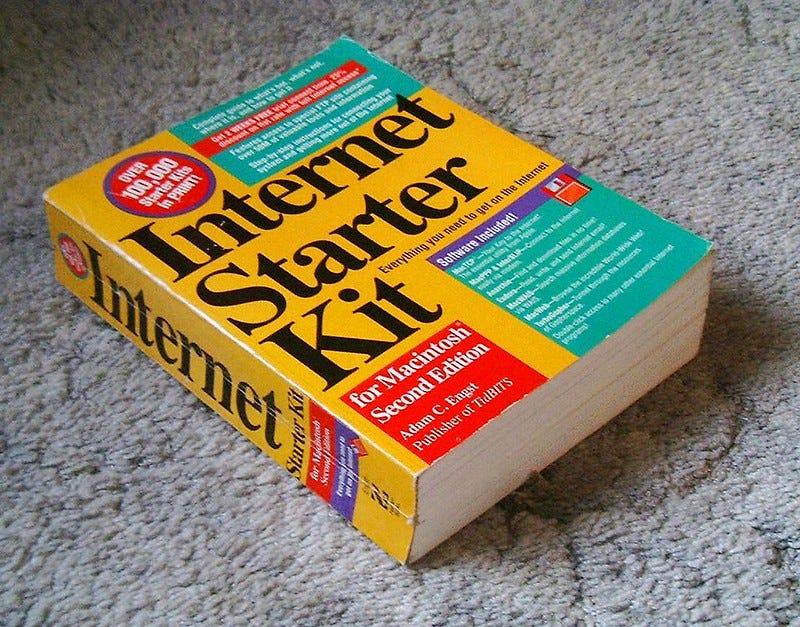Five Things: Cyberspace, Ghosttown, Big Tech Future, Buried Identities, Rising Sealevels
It's Sunday. Read this now.
Hello and welcome back to Five Things!
I spent two days this week on a train and I am not writing this to start complaining about the lack of punctuality of the German railway system these days. I think trains are wonderful and such a great way to travel.
But: I really cannot stand the crappy internet connection. I first went online 30 years ago and I want broadband internet connections everywhere I am. I am so used to just clicking on a link and getting the results right away. On the train, the connection can be stable and gone the next second, which really annoys me. I know that there are reasons for that, but I still think that technology should be able to get a broadband connection on a train.
And yet, I still remember those magic moments when I first went online in the spring of 1995. It changed everything for me. Still, I wanted the internet take different turns in its development.
Here are this Sunday’s Five Things - enjoy!
My First Months in Cyberspace
I also needed some special software to enable my Mac to get online: MacTCP. Internet connectivity wasn’t yet built into the Mac’s operating system and this extra floppy disk alone cost about £60 (£124), as far as I remember. But if you bought the Internet Starter Kit book by Adam C. Engst MacTCP was included alongside other useful programs and almost 1,000 pages of valuable information.
Ha. This article pretty much describes my first online experiences. When I tell my kids about this, they always look at me as if I grew up before modern civilization got started…
It’s Dead Around Here
Last November, I loaded my dog, Woody Guthrie, into the truck for a day trip from Austin. The rain starts as I head out of town, and the low-hanging clouds feel right for this mission. On State Highway 16, just north of Llano, I pull up to Baby Head, a place I did not make up in my nightmares. But to double-check my sanity, I read the Texas Historical Commission marker. Everything I’ve read online about this place—the hill, the community, the cemetery—quotes this marker, which puts the blame for the haunted name on oral tradition. The story goes that after a raid by Native Americans in the 1850s, an Anglo child’s remains were found on the so-called mountain.
It’s pouring rain, but my dog’s happy to get out of the truck and stretch his legs after the drive. I’ve already decided I don’t want to be here. I’d come here to see a ghost town—and this is not a ghost town. But it feels disrespectful to just leave.
I drove across Texas once, it was just the panhandle, and it felt so empty.
We’re Counting on Big Tech to Invent the Future. That’s a Bad Bet.
The vision was compelling, if a little naïve. The internet, optimists argued, would allow individuals and small sellers to reach a global market of customers at low cost and without the need for big retailers. Increased connectivity would also make it easier for people to find work, invest money and learn new skills. Thanks to platforms like eBay, the future belonged to the Davids, not the Goliaths. “Small is the new big” was a popular slogan during those heady years.
The prediction turned out to be wrong. Yes, platforms like Amazon and Google have generated immense wealth and transformed society. But the money and power have not been broadly distributed. Instead, the platforms have captured the lion’s share for themselves, leading to concentrations of wealth that hark back to the Gilded Age. The Davids of the world ended up working hard to make a new set of Goliaths rich.
The vision was indeed amazing, but the outcome sucks a lot.
Hidden in plain sight
Naming his first novel, The Painted Bird, and his third, Being There (1971) – about a naive, reclusive gardener called Chance who finds himself suddenly thrust into the modern world where everyone mistakes his silence for wisdom – I set down my fork and said: ‘They both feel as if there’s a subtext, a hidden story beneath the surface.’ I wondered out loud if it was one of his writerly strategies to hide wartime details in female characters. The question made him so upset that he leapt from his seat as if to flee the restaurant. I grabbed his wrist and held on till he sat down again. Five or 10 minutes of absolute silence followed while, heads down, we both pecked at the remnants of broiled fish and potatoes on our plates.
What a story. I cannot imagine what it must have been like for these kids to survive the Nazi times.
How Soon Will the Seas Rise?
However, not all scientists are convinced by the runaway scenario. Thus, a tension has emerged over how long we have until West Antarctica’s huge glaciers vanish. If their retreat unfolds over centuries, humanity may have time to adapt. But if rapid destabilization begins in the coming decades through the controversial runaway process, the consequences could outpace our ability to respond. Scientists warn that major population centers — New York City, New Orleans, Miami and Houston — may not be ready.
Yikes. Hamburg is close to both the Baltic Sea and the North Sea, so I am a bit concerned about rising sea levels.
That’s it. Have a great Sunday! If you missed last Sunday’s edition of Five Things, have a look here:
— Nico







